<disclosure mode=”full”>I get some software free because of my MVP status. Diskeeper’s one of those freebies. I’m under no obligation to blog about it or say overly fawning things when I do write about it, but you ought to know when I’m talking about stuff I got gratis. So there you have it.</disclosure>
I desperately needed a break from beating my head against the wall of getting DocBook XSL to work using the MSXML and/or EXSLT engines, so I thought I’d take a minute to finish up a post I started a few days ago.
I’ve been using the latest release of Diskeeper (v2007 or v11, depending on where you look) and I’m pretty happy with it so far. I’ve been running it on my personal laptop (WinXP Tablet) and my work laptop (Vista) for several weeks.
There are a lot of little features that show some nice forethought during Diskeeper’s design and development. I like seeing small things like a performance warning when you’re trying to use Diskeeper on battery power.
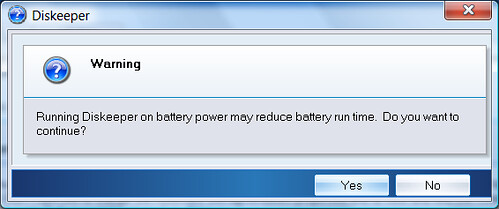
The UI’s completely reworked from the older versions I’ve seen. I can’t say I’m overly enamored with the style of the icons on the toolbar, but they’re not completely horrid. (And you should see the sucky graphics I do, so who am I to throw stones…)
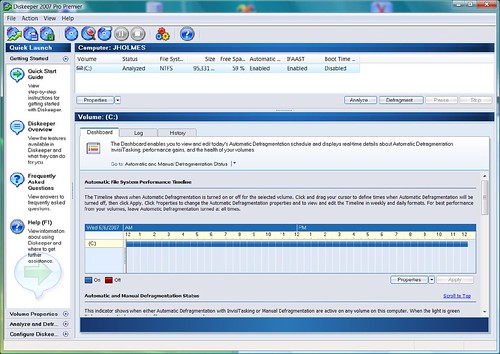
That graphical nit aside, I like the extremely flexible options Diskeeper gives me for scheduling defrags. The automatic defrag timeline lets me block out chunks where I don’t want Diskeeper even breathing. Being able to set different options for different days is very sweet. (I do this despite Diskeeper’s protestations in their documentation that their “InvisiTasking” utilization system will ensure my system won’t be impacted. That may be fine for non-developer geeks, but I’m somewhat anal about trying to keep services on my system to a minimum.)
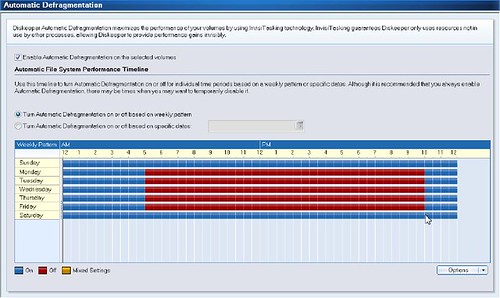
Diskeeper’s got a fancy mode called I-FAAST (around since Diskeeper 10) that supposedly analyzes your system’s file usage and can reorganize files to help boost performance. It sounds nice in theory, but I haven’t noticed any big gain in speed — however, I’ve not been closely monitoring this.
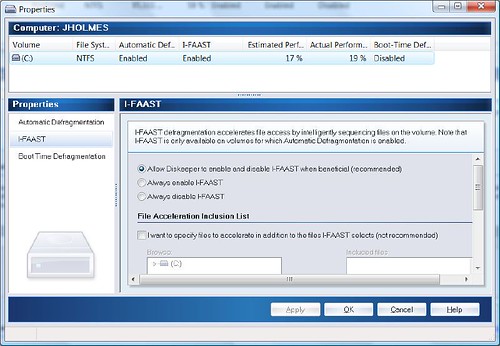
Some files can’t be defragged or moved while the system’s in operation, so you need to have your utility run in a special mode during a reboot. This can be awfully inconvienent since these special defrags can take a long time and I always forget to set them up at a convenient time. Diskeeper helps deal with that by another thoughtful option: schedule reboots with a defrag. You can set up a specific time where the system will reboot and run a boot-time defrag. Cool.
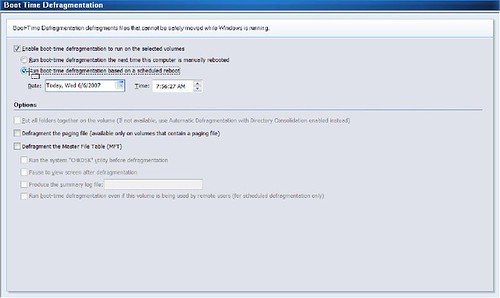
All of the various odds and ends feature configurations are available on a by-volume basis, which is nice. I can set things up so my external drive with my virtual machines and bigger files gets handled differently than my system drive. That’s a bit of sweet flexibility.
Of course there are screens with lots of shiny colors showing you how desperately you need defragmentation.
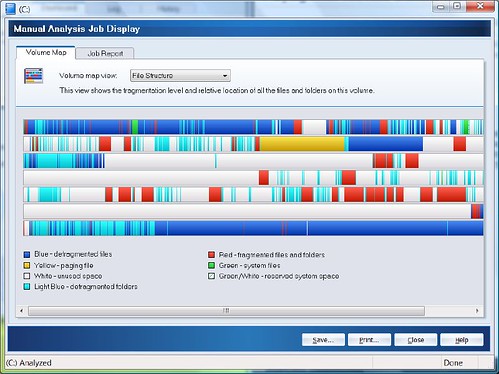
I’m not one to blythely trust any tool’s metrics on how much it’s improving system performance, but there’s certainly a long-term noticable difference with Diskeeper, particularly when I’m using my various virtual machines. I’m sure someone’s done some hard analysis for defragmentation metrics, but at some point I just toss my hands up and say “Yeah, I need it and I know it does good, I just don’t know how much.”
Back to the glowing positives: One final thing that I’m impressed with is the help file. There’s good documentation about how things are done and how you can best use Diskeeper.
Overall I’m very happy with Diskeeper so far.


3 comments:
Its the best defragmenter available and to Diskeeper, i would say its even better than the previous version.
I also had a MVP copy of diskkeeper, and liked it on XP. With the new defragging stuff in vista, is it even needed?
I am a month late to the party :) ..came across this website by accident, but let me add my 2 cents.
I have just finished playing around with my Diskeeper pro 30-day trial installation, and it is indeed excellent. I am also very picky about unnecessary services running in the background, but I have not noticed any performance penalty in leaving dkservice.exe running over the last few days. The auto defrag mode doesnt eat into my system cycles unnecessarily, so very happy with that too. Overall, excellent software.
Post a Comment